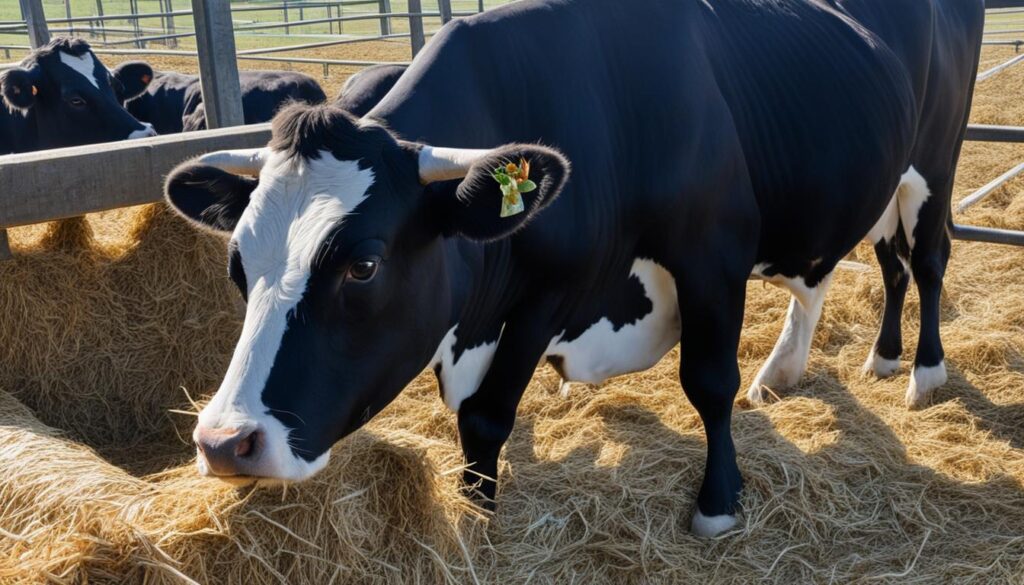When it comes to marrying the practicality of backyard cattle farming with the joy of hobby farming, there’s a hybrid that sparks my interest – the Jersey Dexter Cross. This remarkable breed amalgamates the best of both worlds, promising a wealth of benefits tailored for small-scale operations. As a staunch hobby farmer, I’ve experienced firsthand the substantial rewards of raising these adaptable creatures. They’re not just manageable in size, but also provide excellent milk and meat quality, which can be a boon to any family or community striving for self-sufficiency.
For those of us with an earthy piece of land and a passion for self-reliance, the Jersey Dexter Cross stands out as a stellar choice. Size adaptability readily fits them into varied farm sizes, making them quintessential for crossbreeds hobby farming. Their benefits extend beyond the tangible yield; they embody a sustainable and eco-friendly approach to backyard cattle farming, ensuring your green pastures stay lively and productive. So, let’s delve into how these friendly bovines can transform your farming experience with their diverse advantages.
Key Takeaways
- Discover why Jersey Dexter Cross is a top pick for limited-space farms.
- Learn about the dual-purpose nature of these crossbreeds: milk and meat quality.
- Understand how easy management can benefit your hobby farming venture.
- Gain insights into the sustainability and eco-friendliness of backyard cattle farming with crossbreeds.
- Enhance self-sufficiency with a breed that supports small-scale farming communities.
The Fundamentals of the Jersey Dexter Cross Breed
As an enthusiast of unique cattle breeds, I find the Jersey Dexter Cross to embody a perfect balance between two well-regarded dairy and beef producers. This crossbreed harnesses the superior milk quality of the Jersey breed and the hardiness of Dexter cattle, yielding a seamlessly integrated breed that offers a plethora of crossbreed advantages for small-scale farmers.
Understanding the Genetic Merger: Jersey and Dexter Breeds
The fusion of the Jersey breed characteristics with Dexter cattle traits has produced a lineage well-equipped for efficient and versatile farming. The Jerseys, originating from the Channel Island of the same name, are renowned for their rich, creamy milk and docility. Conversely, Dexters bring forth a natural resilience and dual-purpose functionality, providing both high-quality beef and wholesome milk. This genetic combination encapsulates a robust dairy and beef solution tailored to the eclectic needs of hobby farmers.
Physical Traits and Temperament of Jersey Dexter Cross Cattle
My observation of the Jersey Dexter Cross cattle reveals a harmonious blend of size and temperament. They retain a manageable stature, crucial for small pastures, while expressing a gentle nature that eases daily handling. A comparison table further illustrates the converging traits inherited from their parent breeds:
| Characteristic | Jersey | Dexter | Jersey Dexter Cross |
|---|---|---|---|
| Size | Small to medium | Small | Small to medium |
| Milk Production | High butterfat content | Adequate with good quality | High quality with good butterfat |
| Temperament | Docile, friendly | Hardy, adaptable | Docile and resilient |
| Build | Delicate, refined | Sturdy, muscular | Ideal balance of both |
Adaptability and Suitability for Small Farm Environments
In my farming journey, I’ve noted how adaptable the Jersey Dexter Cross is to varying farm environments. Their versatility shines in small-scale operations where space and resources are at a premium. These cattle thrive on less acreage, graze efficiently on pasture, and reflect hybrid vigor—resisting common cattle ailments and adjusting to diverse weather conditions adeptly.
The value I’ve discovered in the Jersey Dexter Cross extends beyond physical attributes. Their amiable dispositions make them a joy to work with, and their diminutive size compared to conventional cattle breeds means less forage consumed and more sustainable farming. Embracing these crossbreed advantages enables me to optimize the use of my limited farmland, carving a niche for quality over quantity, which has proven immensely fulfilling.
Feeding and Nutrition Management for Optimal Health
When it comes to raising Jersey Dexter Cross cattle, my first-hand experience has taught me that their dietary needs are unique. The nutritional requirements of these crosses are pivotal to their health, vigor, and productivity. To ensure efficient feeding practices, I’ve developed a diet that balances quality forage, grains, and necessary supplements tailored specifically for the Jersey Dexter Cross diet.
Quality forage forms the foundation of their diet; it should be rich in nutrients and easily digestible, like timothy hay or alfalfa. Grains, in moderation, offer energy and are crucial during colder months, while supplements fill any nutritional gaps, ensuring a well-rounded dietary profile for my cattle.
Fostering such efficient feeding practices not only promotes optimal health but also aligns with sustainable farm management. Through diligent care, I maintain the prosperity of the hobby farm ecosystem, where each animal thrives and contributes to a productive cycle.

- Key Components of Forage: Provide a range of grasses and legumes for variety and nutritional balance.
- Grain Strategy: Introduce grains conservatively, ensuring they’re limited to prevent over-conditioning.
- Supplement Wisely: Tailor supplements based on individual health assessments and seasonal needs.
Ultimately, the bond between farmer and livestock is enriched by the care we invest in their nourishment. As I tend to my Jersey Dexter Cross cattle, I see the results of efficient feeding practices in their robust health, and in turn, they provide my farm with invaluable resources.
Medical Care and Regular Health Check-Ups
Ensuring the health of your Dexter Jersey Cross livestock is not dissimilar to maintaining your own health: it requires regular monitoring and care. In my experience, keeping up with veterinary care for crossbreeds is essential for their longevity and productivity. Let’s delve into the specifics of maintaining your herd’s health.
Common Health Concerns in Jersey Dexter Crosses
I’ve noticed that while Dexter Jersey Cross cattle are generally hearty, they do face some common health concerns. It’s important for you to be able to identify and address these promptly to ensure Dexter Jersey Cross health maintenance. Conditions such as respiratory infections, digestive issues, and hoof problems are more common than you might think.
Scheduling Vet Visits and Maintaining Health Records
A cornerstone of preventive healthcare is scheduling regular vet visits. Aim to have a vet check on your cattle at least twice a year. Effective health records are pivotal—they not only track the medical history but also help in making informed decisions about the herd’s healthcare and management strategies.
Here’s a brief guide on what your health records should entail:
| Date | Visit Type | Vet Actions | Notes |
|---|---|---|---|
| April 10, 2023 | Bi-annual Check-up | Vaccinations, Basic Physical Assessment | No concerns noted |
| October 15, 2023 | Bi-annual Check-up | Deworming, Hoof Trimming | Recommendation to increase dietary fiber |
Preventative Healthcare Strategies for Longevity
Preventative care for crossbreeds like ours goes beyond just vet visits. It encompasses a lifestyle and housing adjustments to nip potential health issues in the bud. This includes providing adequate shelter, ensuring proper nutrition, and implementing regular exercise routines for the cattle. Additionally, vaccinations play a crucial role in preventing diseases rather than treating them.
In my practice as a hobby farmer, I’ve found that these steps are instrumental in not only maintaining the health of my cattle but also in reducing long-term veterinary costs. It’s an investment that pays off in both their well-being and the sustainability of my farming efforts.

Jersey Dexter Cross: Breeding Practices and Considerations
In the realm of hobby farming, breeding practices hold a paramount place, especially when dealing with a Jersey Dexter Cross. My approach to the reproductive health of these cattle is to first ensure genetic diversity, an aspect critical for the vitality and robustness of the herd. It’s a delicate balance to strike: finding cattle with the desired traits while maintaining a diverse gene pool to keep the bloodline hearty. Through mindful crossbreeding strategies, I meticulously pair individuals to enhance qualities like milk production, temperament, and size, all while avoiding the pitfalls of inbreeding.
When it comes to breeding Jersey Dexter Cross, timing and observation are key. I monitor my livestock’s cycles closely and seek out optimal conditions to encourage successful conception and gestation, keeping welfare and animal comfort at the forefront of my breeding program. My past experiences reveal that subtle changes in behavior and physicality can indicate the best breeding times. Moreover, managing the breeding process to safeguard the cows’ health during and after pregnancy ensures the continuity of a flourishing, productive farmstead.
Fostering reproductive health is not solely about successful breeding events; it extends into prenatal and postnatal care, a holistic strategy that spans the entire lifecycle of my cattle. By investing in regular veterinary health checks and staying attuned to each animal’s needs, I contribute to a lineage of Jersey Dexter Cross that is sound, prolific, and ideally suited for the demands and rewards of small-scale farming. Each calving season is a testament to the care and thought invested in this process, echoing the fulfillment one finds in nurturing thriving life on the homestead.
